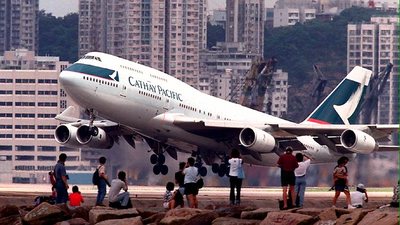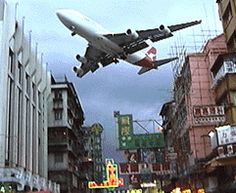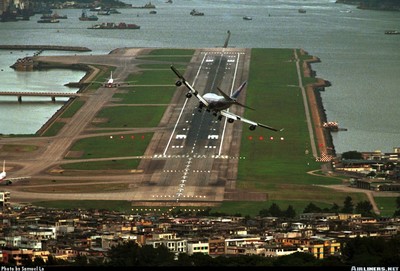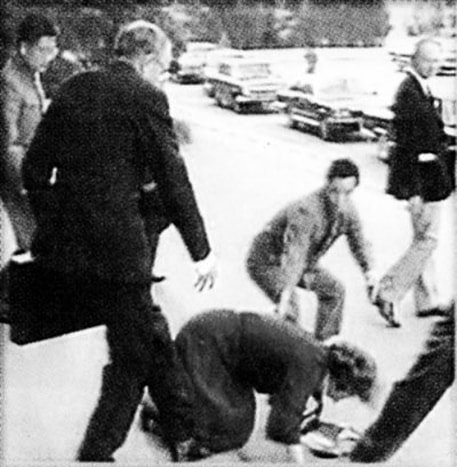Kai Tak and Mrs Thatcher
I'm disappointed with my Airport posting. But I soon embraced the work - I had no choice. With lots of tourists, my English was in demand as roles now reversed as I translated for my colleagues.
On joining the Airport Division, I'm marched into District Commander Stuart Kavanagh's office. He's a renowned blunt, uncompromising sort who is a legend for making an officer faint. His verbal reprimands could shake the whole building.
"So, I suppose you fancy yourself, working here, loads of trolly dollies. You'll be shagging yourself silly."
"No sir", I replied, "I wanted to join the Emergency Unit. Do a real job."
I'd caught him off guard or in a good mood. I escaped unhurt. Although, I heard he later asserted.
"Cheeky bugger, that one".
My role was simple in statement, demanding in execution. First, keep the airport perimeter secure with officers operating the gates and checkpoints. Then, on top of that, I deal with the thefts, disputes, drunks and the occasional VIP movement.
Airports have a buzz about them. And Kai Tak, with its bottom-twitching approach to Runway 13, has an extra vibrancy. But it's not all glamour and fun.
One of the saddest duties I ever performed was at Kai Tak Airport. On 8th June 1982, the Sir Galahad and Sir Tristram attack at Bluff Cove in the Falklands had a profound impact on Hong Kong.
Four local Chinese members of the Royal Fleet Auxiliary died that day. The local garrison handled the return of the bodies to Hong Kong with great dignity. Tasked to represent the Force, I lined up on the apron.
With the families in attendance, the bodies came off the plane. An honour guard drawn up of the military and local dignities stood in solemn repose. I like, many others present, remained composed until the Piper started a lament. It always gets me.
The Airport kept me busy, not least because Kai Tak was often the scene of rowdy departure parties. The proximity of the Airport to town made this possible. On occasion, things got out of hand. Why some people elect to travel blind drunk is beyond me.
Maybe it's a fear of flying or the relief of being on holiday, leaving your daily troubles behind. No matter the reason, it is also true that drunk people are not usually welcome on planes these days. In the early 1980s, the regime was more relaxed.
I got my fair share of trouble from drunk passengers. Some believed that once through immigration, they'd entered a law-free and consequence-free zone. As a result, fights would occur airside, with the culprits dashing for their plane to escape our attention.
What came next followed a pattern. With demands to leave the aircraft ignored, the pilot then directed us to remove the drunks. A swift extraction followed, accompanied by threats of legal action against us. Then, finally, it's tears and regrets. Constantly the same sequence of emotions.
The airlines usually allowed the culprits to travel the next day. But, of course, that's assuming we'd released them. For one American chap, his antics had repercussions. A stream of racial abuse at the check-in and threats resulted in his arrest for disorderly conduct. A swift trip to court the next day saw a fine imposed. But that was the start of his troubles.
The airline then refused to take him. As word spread through the airport community, other airlines placed an embargo on him. Stranded, he begged us to intervene. He visited me pleading that we speak to the airlines. Finally, running short of money, he took a train to the Mainland and booked a flight there.
Kai Tak had a flight curfew starting at around 11 pm. This shut down was necessary if Kowloon residents were to get any sleep. However, that did not mean that the terminal was empty.
Each evening hundreds of school kids would gather in the departures hall. Then, taking advantage of the air conditioning, they settled down to do their homework. On my patrols, the more confident ones would grab me to check their homework.
Courting couples also appeared, mooching about the place. Anyhow, a complaint about a couple "making the beast with two backs" in the Airport Chapel meant we closed that at night. Get a room, please.
Incursions into the secure area caused questions and considerable scrutiny. To keep staff on their toes, regular exercises had outside units trying to sneak in.
To gain entry at the terminal, you had to be creative. I saw officers hanging under trucks, even disguised as aircrew with fake papers. The elaborate preparations were noteworthy.
Meanwhile, I was unaware that momentous events were unfolding around me. The future of Hong Kong was on the politician's agenda. Yes, I knew that Hong Kong was ceded to the British by China following the Opium Wars. Moreover, the current Chinese regime did not recognise this arrangement. Not surprising.
With the lease on the New Territories about to expire in 1997, the bankers began to express reservations about mortgage loans. This concern, in turn, prompted the British to raise the issue with China, and the rest is history.
I was on duty the September night in 1982 when Margaret Thatcher arrived at Kai Tak Airport after her fateful visit to Beijing. She was striding across the world stage, holding her head high. The Iron Lady still basking in the glory of the successful Falklands campaign. But, in Beijing, her attempts to get Deng Xiaoping to accept continued British rule went nowhere.
With China holding all the cards, Deng stood firm with a resolute rejection of any such notion. The exchange between Thatcher and Deng described as 'abrasive,' left Thatcher chastened. Her 'Iron Lady' image dented; she was well and truly out-gunned.
On leaving the meeting with Deng, she slipped on the steps of the Great Hall of the People. The moment captured on film is repeatedly played on the news channels. In superstitious Hong Kong, her tumble was a bad omen.
Given China's position, Britain had no other option but to accept the "one country, two systems" concept. It's an elegant and pragmatic solution, some asserted. Others expressed reservations. Given that many questions remained unanswered, the devil was in the detail.
As Thatcher arrived in Hong Kong following her meetings in Beijing, the people of Hong Kong were hanging on her every word. As she came off the plane, I observed that she looked tired. Unwilling to speak to the waiting media, she brushed them off with her imperial manner.
In no time, we escorted her to a car that whisked her away, wrapped in a blanket. This detail baffled me for years as its a warm evening. I later learnt she had the flu.
As my first tour was coming to an end, Hong Kong's future was becoming more evident. I also needed to make some decisions about my direction—a no-brainer given the fun I was having. I'd passed my probation plus secured credits in the promotion exams. That earned me accelerated advancement to a senior inspector.
With four months overseas leave ahead of me, a load of money in my pocket, I took off in March 1983 for Hawaii. Relaxation was on the agenda. Next, I hit the mainland USA, taking in San Francisco, Las Vegas, New York and Boston before arriving in the UK.
On joining the Airport Division, I'm marched into District Commander Stuart Kavanagh's office. He's a renowned blunt, uncompromising sort who is a legend for making an officer faint. His verbal reprimands could shake the whole building.
"So, I suppose you fancy yourself, working here, loads of trolly dollies. You'll be shagging yourself silly."
"No sir", I replied, "I wanted to join the Emergency Unit. Do a real job."
I'd caught him off guard or in a good mood. I escaped unhurt. Although, I heard he later asserted.
"Cheeky bugger, that one".
My role was simple in statement, demanding in execution. First, keep the airport perimeter secure with officers operating the gates and checkpoints. Then, on top of that, I deal with the thefts, disputes, drunks and the occasional VIP movement.
Airports have a buzz about them. And Kai Tak, with its bottom-twitching approach to Runway 13, has an extra vibrancy. But it's not all glamour and fun.
One of the saddest duties I ever performed was at Kai Tak Airport. On 8th June 1982, the Sir Galahad and Sir Tristram attack at Bluff Cove in the Falklands had a profound impact on Hong Kong.
Four local Chinese members of the Royal Fleet Auxiliary died that day. The local garrison handled the return of the bodies to Hong Kong with great dignity. Tasked to represent the Force, I lined up on the apron.
With the families in attendance, the bodies came off the plane. An honour guard drawn up of the military and local dignities stood in solemn repose. I like, many others present, remained composed until the Piper started a lament. It always gets me.
The Airport kept me busy, not least because Kai Tak was often the scene of rowdy departure parties. The proximity of the Airport to town made this possible. On occasion, things got out of hand. Why some people elect to travel blind drunk is beyond me.
Maybe it's a fear of flying or the relief of being on holiday, leaving your daily troubles behind. No matter the reason, it is also true that drunk people are not usually welcome on planes these days. In the early 1980s, the regime was more relaxed.
I got my fair share of trouble from drunk passengers. Some believed that once through immigration, they'd entered a law-free and consequence-free zone. As a result, fights would occur airside, with the culprits dashing for their plane to escape our attention.
What came next followed a pattern. With demands to leave the aircraft ignored, the pilot then directed us to remove the drunks. A swift extraction followed, accompanied by threats of legal action against us. Then, finally, it's tears and regrets. Constantly the same sequence of emotions.
The airlines usually allowed the culprits to travel the next day. But, of course, that's assuming we'd released them. For one American chap, his antics had repercussions. A stream of racial abuse at the check-in and threats resulted in his arrest for disorderly conduct. A swift trip to court the next day saw a fine imposed. But that was the start of his troubles.
The airline then refused to take him. As word spread through the airport community, other airlines placed an embargo on him. Stranded, he begged us to intervene. He visited me pleading that we speak to the airlines. Finally, running short of money, he took a train to the Mainland and booked a flight there.
Kai Tak had a flight curfew starting at around 11 pm. This shut down was necessary if Kowloon residents were to get any sleep. However, that did not mean that the terminal was empty.
Each evening hundreds of school kids would gather in the departures hall. Then, taking advantage of the air conditioning, they settled down to do their homework. On my patrols, the more confident ones would grab me to check their homework.
Courting couples also appeared, mooching about the place. Anyhow, a complaint about a couple "making the beast with two backs" in the Airport Chapel meant we closed that at night. Get a room, please.
Incursions into the secure area caused questions and considerable scrutiny. To keep staff on their toes, regular exercises had outside units trying to sneak in.
To gain entry at the terminal, you had to be creative. I saw officers hanging under trucks, even disguised as aircrew with fake papers. The elaborate preparations were noteworthy.
Meanwhile, I was unaware that momentous events were unfolding around me. The future of Hong Kong was on the politician's agenda. Yes, I knew that Hong Kong was ceded to the British by China following the Opium Wars. Moreover, the current Chinese regime did not recognise this arrangement. Not surprising.
With the lease on the New Territories about to expire in 1997, the bankers began to express reservations about mortgage loans. This concern, in turn, prompted the British to raise the issue with China, and the rest is history.
I was on duty the September night in 1982 when Margaret Thatcher arrived at Kai Tak Airport after her fateful visit to Beijing. She was striding across the world stage, holding her head high. The Iron Lady still basking in the glory of the successful Falklands campaign. But, in Beijing, her attempts to get Deng Xiaoping to accept continued British rule went nowhere.
With China holding all the cards, Deng stood firm with a resolute rejection of any such notion. The exchange between Thatcher and Deng described as 'abrasive,' left Thatcher chastened. Her 'Iron Lady' image dented; she was well and truly out-gunned.
On leaving the meeting with Deng, she slipped on the steps of the Great Hall of the People. The moment captured on film is repeatedly played on the news channels. In superstitious Hong Kong, her tumble was a bad omen.
Given China's position, Britain had no other option but to accept the "one country, two systems" concept. It's an elegant and pragmatic solution, some asserted. Others expressed reservations. Given that many questions remained unanswered, the devil was in the detail.
As Thatcher arrived in Hong Kong following her meetings in Beijing, the people of Hong Kong were hanging on her every word. As she came off the plane, I observed that she looked tired. Unwilling to speak to the waiting media, she brushed them off with her imperial manner.
In no time, we escorted her to a car that whisked her away, wrapped in a blanket. This detail baffled me for years as its a warm evening. I later learnt she had the flu.
As my first tour was coming to an end, Hong Kong's future was becoming more evident. I also needed to make some decisions about my direction—a no-brainer given the fun I was having. I'd passed my probation plus secured credits in the promotion exams. That earned me accelerated advancement to a senior inspector.
With four months overseas leave ahead of me, a load of money in my pocket, I took off in March 1983 for Hawaii. Relaxation was on the agenda. Next, I hit the mainland USA, taking in San Francisco, Las Vegas, New York and Boston before arriving in the UK.
Copyright © 2015



